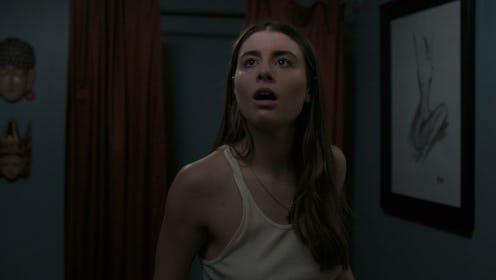
In theaters as of Jan. 26, the new thriller Desolation focuses on the inner workings of the human mind and the worries and anxieties that can slowly and painfully chip away at a person's soul. Most of the film takes place in Hollywood, and so the fact that it's coming out at a time when sexual assault and misconduct, and the mental effects that behavior can have on a person, are on everyone's minds, is a coincidence even its star has noted.
“The film essentially deals with men in a position of power, coincidentally in Hollywood, manipulating women — specifically women who are in a vulnerable state,” says Dominik García-Lorido, speaking recently over the phone. The assertion of male power and the violation of women are key themes in the movie, just as they are in real life right now. Desolation wasn't created for the #MeToo period; director David Moscow created a Kickstarter for its post-production in September 2015, long before the current wave of Hollywood allegations. But its timeliness is striking nonetheless.
“I grew up in a family with very powerful women and I always was taught I had a voice and that… men and women are equal, 1000 percent,” says García-Lorido. “So I never felt like I couldn’t voice my opinion. But I have seen how people can, even the littlest thing, be manipulated and how sex sells in this business.”
In Desolation, García-Lorido plays Katie, a woman dealing with trauma from a sexual assault that occurred before the movie's start. To keep her mental health in check, she lives in a calm environment, clocks in and out of a dull job, lives with a caring roommate, takes medication, and goes to therapy. But as the story progresses, the audience can see Katie's sense of control start to unravel. Multiple male characters slowly chip away at her carefully built composure, and Katie's resolve begins to falter.
“When all these things start to happen to her, and her meds are taken away from her and all these people are toying with her mind, all these different triggers surrounding her, then you really see the depth of the trauma behind it,” explains García-Lorido. “You still see the ramifications of that and how that always lives in a person. And I think the guilt is portrayed, the shame, the sadness... the post traumatic stress of it, all the trust issues. All of it.”
Yet despite the challenges she faces. Katie exhibits strength and will, which allowed García-Lorido to pour a ton of “personal stuff” into the role and play Katie as not a victim bound to break, but as a warrior. “Even though she’s been through so much and she’s going through so much in the film, she’s a fighter,” says the actor. “She’s not weak.” And in a society that makes women keep their guards up around every corner, García-Lorido says we can all learn from how Katie stands by her decisions no matter how much opposition she faces. “At the end of the day, fight for yourself and you know what you believe in," García-Lorido says.
García-Lorido, the daughter of actor Andy García, says that the role of Katie was a great fit. “I like when things are gritty and honest and I love acting because it shows the ugly side — which I think is the beautiful side — of human beings,” she explains. “I have no interest in trying to portray perfection because that’s not real, you know?”
With Katie, García-Lorido accessed the character's resilience, but also her vulnerability when it comes to abandonment and isolation. “The loneliness was really a key thing for me with her,” the actor says. “And without even having to go through the exact same life experiences, the emotions that she feels are universal.”
In the future, García-Lorido hopes to keep bringing relatable, tough characters to life. “If I’m not constantly challenging myself, if I play it safe — which I hope I never do — then I will never grow,” she says. “You wanna do something that’s scary and new and is gonna tap a button in you that’s uncomfortable.”
And Desolation, a story bound to make you comfortable with its honest discussion of assault and its aftermath, is just that.